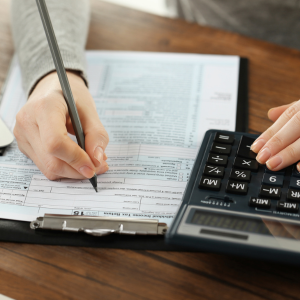
In Georgia, selling a home may rank as one of the most emotional and financially demanding activities a person may undertake during their lifetime. Numerous impactful tax issues need to be tackled, hinged chiefly on the profit from sales, well-defined as capital gains. Understanding the available capital gains tax exemptions and their applicable documentation is critical to making the right financial progress. This paper outlines the rules for capital gains taxation in Georgia for sales and explains what any householder must be prepared for before selling their residence.
Understanding Capital Gains Tax After Selling a House in Georgia
When you sell your home in Georgia, understanding capital gains tax is essential for making informed financial decisions and protecting your hard-earned equity. During a home sale, many homeowners are taken by surprise by factors surrounding home sale capital gains, tax obligations, and the implications of having taxable income. For taxable income, homeowners often overlook how a home sale can alter their financial status.
Part of the issue is how capital gains tax is handled. For homeowners, capital gains are the difference between the selling price of the home and the acquisition price, adjusted for some costs associated with selling and improvements. The net gains ‘realized’ could be subject to taxation, which can change the total selling net and the whole financial and future tax plans.
All real estate taxes, including the real estate gains tax and the taxable income on other real estate, require consideration; adopting a strategy that minimizes tax exposure and maximizes return is an example of defensive tax planning. Exemptions, deductions, and the rules governing primary residences versus investment properties can significantly influence the total tax owed. Understanding and applying these head concepts are critical in the legal, financial, and procedural steps in selling a house in Georgia; they help you realize your home sale objectives and income-earning protection.
Nance Homebuyer helps Georgia homeowners navigate the complexities of selling their home, including capital gains tax, so you can maximize your profits and protect your hard-earned equity. Our team guides you through exemptions, deductions, and all tax considerations, making the selling process stress-free and straightforward.
How Capital Gains Are Calculated for Georgia Homeowners
Calculating capital gains tax when selling a home in Georgia requires attention to your sale price, purchase price, and property improvements. Capital gains are the profits earned from selling real estate above your original purchase price. The IRS and the Georgia Department of Revenue tax these gains, with specific rates, exemptions, and rules.
To calculate your gains, determine your home’s adjusted cost by adding significant improvements (like a new roof or remodeled kitchen) to the original purchase price. Subtract this from your sale price to find your taxable gain. For example, if you bought a home for $250,000 and added $25,000 in improvements, selling it for $400,000 yields a $125,000 gain before deductions and expenses. Capital gains are separate from ordinary income and taxed differently.
Georgia generally follows federal rules. Short-term gains (owned ≤1 year) are taxed at your regular income rate, while long-term gains (owned >1 year) usually have lower rates. Homeowners may qualify for the federal home sale exclusion, up to $250,000 ($500,000 for married couples) if the home was a primary residence for at least two of the last five years, which Georgia typically honors.
Second homes and inherited properties are exceptional slip-and-fall cases, so different rules govern them. Usually, inherited properties receive a stepped-up basis to the fair market value at the date of inheritance, thus reducing the taxable gain. The purchase price and any improvements and expenses need to be documented to substantiate the cost basis.
Trusts, estates, and multiple owners can influence the division of a gain. Consulting with a certified real estate tax planner guarantees proper reporting and the highest possible utilization of tax relief.
By carefully tracking purchase costs, improvements, selling expenses, and applicable exclusions, Georgia homeowners can minimize capital gains tax and maximize profits while remaining compliant with state and federal rules.
Georgia’s Approach to Capital Gains Tax
In Georgia, capital gains tax implementation and other state-specific regulations incorporate federal tax rules, which means that real estate owners unknowingly have to pay taxes at different levels when selling real estate. The capital gain calculations, as laid down by the IRS, have specific rules, like determining the adjusted basis, deductions that can be received, and short—and long-term gains. Georgia incorporates additional rules that impact taxable figures and the rules of reporting them.
Real estate owners need to understand the difference and alignment of federal and state rules to understand the tax liability that needs to be paid fully. For instance, the primary residence exclusion, a federal rule, may behave differently from the rules of Georgia. Also, Georgia incorporates capital gains tax into the state income tax, which means that capital gains tax, even if federally exempt, will impact your state taxes.
To comply with tax laws requiring proper reporting of gains, claiming entitled deductions, and discrepancies between IRS and Georgia Department of Revenue treatment, staying informed of rules and regulations keeps surprises to a minimum and optimizes a tax strategy on Georgia home sales. One key factor is understanding how long to live in a house before selling, since occupancy timelines directly affect capital gains exemptions and overall tax liability.
Have questions about how capital gains tax affects your Georgia home sale? Contact us today for a personalized offer and guidance. Let us help you navigate the details and maximize your proceeds.
Differences Between the State and Federal Levels in Georgia

As with other states, when selling a home in Georgia, the federal and state governments impose a capital gains tax, with the difference being significant in tax management. The IRS splits federal capital gains tax into short-term and long-term, based on ownership duration (owned ≤ 1 year; taxed as ordinary income) and (owned >1 year; taxed at 0%, 15%, or 20% based on income). Also, the federal home sale exclusion grants a classifier of up to $250,000 (just $500,000 for a married couple) in exclusionary gains during the home sale, provided the homeowner resided in the house for 2 years during the last 5 years.
Georgia generally conforms to federal rules but treats all gains as part of state income tax at a flat 5.49%, regardless of short- or long-term status. Georgia may require some exempt income to be added, which differs slightly from state reporting. Filling such gaps requires meticulous recordkeeping. Unlike federal law, Georgia includes all income sources in taxable income, including home sale gains, which can significantly increase the total state tax bill.
Georgia incorporates federal tax law revisions and applies the same stepped-up basis rules, excluding any gains on inherited property. Utilizing all permissible exclusions and deductions enables rational accounting systems to gain meticulous insights into federal and state regulations. This helps reduce the overall gains tax imposed and the proceeds when selling a home in Georgia.
Tax Rate Implications on Home Sale Gains
The taxation policies you encounter while selling a house in Georgia are highly pertinent to calculating net profit and overall tax liability. Thus, understanding these policies is critical to formulating a strategy for profit maximization and taxation. You are also subject to several taxes when you sell real estate in Georgia. These include the federal capital gain tax, Georgia state income tax, and several local taxes.
Each rate is affected by your total taxable income, how long you have held the property, and whether that gain is short-term or long-term. Long-term gains, which arise from properties held for a year or longer, are almost always subject to lower federal taxation than short-term gains, which are assessed as ordinary income.
Georgia has specific modifications to this that may change your tax burden from federal rules alone. For example, the state has some deductions and exemptions that may decrease the taxable portion of your gain. On the other hand, the state may also require you to report other gains that the federal government does not. Knowing how these rules blend is essential. Even minimal errors can result in unwarranted tax expenses and lower profits.
The information on Georgia’s tax capital gains benefits a homeowner’s strategic planning regarding a home sale tax exemption, reinvestment options, etc. Understanding how these tax rates interact will assist a homeowner in taking preventative measures to avoid the loss of their investment and dealing with surprises at the home sale tax filing stage.
How Capital Gains Tax Rate Impacts Your Tax Liability in Georgia

The tax rate on your capital gains is a significant factor in determining your liability after selling a Georgia home. Federal capital gains rates depend on how long you’ve owned the property: short-term gains (owned ≤1 year) are taxed at ordinary income rates up to 37%, while long-term gains (owned >1 year) are taxed at 0%, 15%, or 20%, depending on income and filing status. This makes long-term ownership beneficial for reducing federal taxes.
Georgia has no separate capital gains tax; all gains are taxed as ordinary income at a flat 5.49%. Unlike federal rates, Georgia does not offer discounts for long-term gains, so every dollar of profit is taxed the same at the state level. Even if federal exclusions apply, remaining taxable income may still face Georgia’s flat rate.
Assuming you purchased a house worth $300.000, added $40.000 in worth in remodelling, and sold the home at $475.000, you would gain $135.000. Federal exclusions (up $250,000 $500,000 for sellers who qualify) may apply to reduce the tax to $0. In Georgia, tax scholars, especially for Georgia investment properties, presume the state aligns with the exclusion. Exceptional cases do remain where property investment and selling may incur tax.
Selling the property, combined with the additional income, results in tax gains. Ancillary income aids in reducing the tax liability, which is quite inevitable with gain realizations. Exceptional cases like property inherited, divorce, trust, and estate may have distinct tax exclusions and different rates, and how the gain is depicted is restrictive.
Many homeowners work with a cash for houses company in Atlanta and surrounding Georgia cities to simplify the sale process, avoid costly repairs, and close quickly. Accurate recordkeeping and early planning are crucial. Understanding how federal and Georgia rates interact, leveraging exclusions, and consulting a tax professional can help you minimize your capital gains tax and maximize your net proceeds from a home sale.
Income Tax vs. Capital Gains: What Georgia Sellers Should Know
Selling a home in Georgia means grappling with income and capital gains tax to appreciate their effect on liability versus the overall profit retained. Each tax type warrants a separate computation, rate, and filing process, which can significantly diminish your remaining profit.
On the federal level, the IRS charges a capital gains tax on the profit realized from selling a piece of real estate. Short-term gains (property held ≤1 year) and Long-term gains (property held for > 1 year) are taxed at different rates. Short-term gains are charged ordinary income tax rates, while long-term gains usually give preferential rates. Georgia supplements these rules on top of federal regulations, which tends to kink the tax reporting process and the tax owed.
Taxable gain depends on purchase price, improvements, closing costs, and deductible expenses. Exemptions, such as the federal primary residence exclusion, can shelter some of your gains if the eligibility criteria are met.
Meticulous strategy development and record administration—tracking upgrades, upkeep, and deductible expenses—can help avoid unforeseen tax liabilities and maximize profit (a primary objective of every firm in its operation). Understanding the processes involved in the Federal tax return and the state of Georgia taxation processes is beneficial to reporting with reasonable accuracy in calculating tax payable.
This text outlines practical approaches to tax gain reporting while elucidating the nuances of taxation based on income and capital gains within Georgia. It also discusses approaches to managing investments and expenses eligible for deduction to safeguard the profit accrued from the sale of the principal residence.
Tax Filing Tips for Reporting Gains from a Home Sale

Successfully selling a home in Georgia involves more than collecting a check; you must accurately report your gains on federal and state tax returns. Many homeowners wonder how income tax and capital gains tax affect their finances, since proper reporting and planning can protect investments and optimize tax outcomes.
Profits, also known as capital gains, are reported separately from your ordinary income gains on sales of investments on IRS Form 8949 and Schedule D. Georgia has a similar requirement on your state return. Proper documentation—purchase price, renovation costs, closing, and selling costs supports your claims in case of audit and boosts your cost basis, reducing taxable gains.
Primary residences are eligible for exclusion up to $250,000 (or $500,000 if married) for capital gains. Still, gains on all other investment and vacation properties or business use portions are taxed as ordinary income. At the same time, rental or business use can trigger depreciation recapture and increase taxable income. With records of your transactions and proper planning of the timing of your sale, you can lower the federal taxes while ensuring Georgia’s flat income tax is also accurate.
Inherited or jointly held properties need special consideration for the stepped-up basis and ownership percentage. Review all exclusions and deductions, as eligibility for all exclusions and deductions, as Georgia usually abides by IRS rules, but may have unique state changes. Digital tax software may assist, but always ensure that the numbers on the federal return match the state return to prevent discrepancies that result in an audit.
In conclusion, selling a home in Georgia involves more than simply understanding the selling process. Careful recordkeeping, federal and state taxation planning, and determining the latter in a long-term strategy are also critical components. Working with a qualified tax professional guarantees the sales tax return will be filed correctly, tax proceeds will be maximized, and the sale will be integrated and harmonized with the taxpayer’s overall broader financial objectives.
Exemptions and Deductions That Reduce Capital Gains Tax
Reducing your capital gains tax after selling property in Georgia involves more than simply calculating profit—it requires strategically leveraging all available exemptions, deductions, and exclusions. A key tool is the primary residence exclusion, which lets qualifying sellers exclude up to $250,000 of capital gains from taxable income, or $500,000 for married couples filing jointly. This federal provision can significantly reduce your tax liability, though it’s only one part of the picture.
Other strategies include subtracting the cost of home improvements—such as major renovations, additions, or energy-efficient upgrades—from the sale price to lower taxable gains. Certain closing costs, buying and selling expenses, mortgage interest, or property taxes may qualify as deductions if properly documented.
Navigating these strategies requires careful attention to both federal and Georgia tax rules. While federal law sets baseline exclusions and deductions, Georgia taxes capital gains at your ordinary state income rate. Understanding how the two systems interact is essential, as overlooked deductions or conflicting rules can reduce potential savings.
You can maximize available tax benefits by tracking eligible improvements, keeping detailed expense records, and consulting a tax professional familiar with Georgia real estate. Knowledge and preparation are key to keeping more of your hard-earned money after selling your Georgia home.
Qualifying for Gains Tax Exclusions After a Georgia Home Sale
One of the most effective ways to reduce capital gains tax after selling a Georgia home is through the primary residence exclusion. Rooted in federal and Georgia tax law, this provision lets homeowners exclude up to $250,000 of gains ($500,000 for married couples) if they’ve owned and lived in the property as their main home for at least two of the past five years. These years don’t have to be consecutive, offering flexibility for life changes like job moves or family planning.
Cash house buyers in Georgia can provide a practical option for homeowners looking for a fast, hassle-free sale, allowing sellers to avoid lengthy listing processes and focus on tax planning. Gains above the exclusion threshold are taxable. For example, a $700,000 gain for a married couple would leave $200,000 subject to tax. Special situations like inherited property may reset the property’s basis, potentially lowering taxable gains. Second homes and investment properties generally don’t qualify for the exclusion, so planning is essential.
Conversions from rental or investment properties count only for the period used as a primary home, making accurate records and careful planning crucial. The exclusion can be claimed multiple times, provided you meet the two-out-of-five-year rule and haven’t claimed it on another property in the past two years. Partial exclusions may apply for unforeseen life events like job relocations or health issues.
Keep detailed records of ownership, residency, and improvements to support your claim. Consulting a Georgia tax professional can help maximize savings by combining the exclusion with deductions for improvements, mortgage interest, and selling costs. With proper planning, the primary residence exclusion can significantly lower your taxable gains and make your home sale more financially rewarding.
Strategies for Minimizing Gains Tax When Selling Real Estate in Georgia
Minimizing capital gains tax when selling real estate in Georgia requires strategic planning, knowledge of the tax code, and using available exemptions and deductions. While Georgia follows federal rules, state-specific nuances can affect tax liability, so careful preparation is essential.
Accurately calculating your property’s adjusted basis, including purchase price, eligible home improvements, and any depreciation, is crucial, as missing documentation can increase taxable gains. Timing your sale strategically, particularly using the primary residence exclusion ($250,000 for individuals, $500,000 for married couples), can significantly reduce or eliminate taxes. Market conditions and personal income should also guide the timing of your sale.
Additional deductions, like closing costs, selling expenses, and substantial home improvements, further lower taxable gains. Working with a tax advisor familiar with Georgia and federal laws ensures strategies are applied correctly and documentation is compliant.
Georgia homeowners can maximize profits, simplify tax reporting, and navigate state and federal capital gains requirements by maintaining thorough records, understanding exemptions, and strategically planning sales. A practical, Georgia-specific gains tax checklist turns a complex process into a clear, manageable plan.
Need to sell your house? Sell fast, skip costly repairs, and enjoy a hassle-free process with Nance Homebuyer. We give fair cash offers, handle all the details, and make it easy. Call +17707582729 for a no-obligation offer today!
Helpful Georgia Blog Articles
- Fixing Up a House to Sell in Georgia
- Selling Your House with Tenants in Georgia
- Selling a House During Divorce in Georgia
- How to Sell a House Without a Realtor in Georgia
- Does a Seller Pay Closing Costs in Georgia?
- Capital Gains Tax After Selling a House in Georgia
- I Inherited a House in Georgia Now What?
- Selling Shares of Your Home in Georgia
- How Long to Live in a House Before Selling in Georgia
- How To Sell A House With A Mortgage In Georgia

